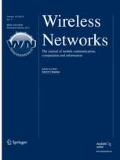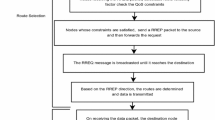Abstract
Multicast is an efficient method for transmitting the same packets to a group of destinations. In energy-constrained wireless ad hoc networks where nodes are powered by batteries, one of the challenging issues is how to prolong the multicast lifetime. Most of existing work mainly focuses on multicast lifetime maximization problem in wireless packet loss-free networks. However, this may not be the case in reality. In this paper, we are concerned with the multicast lifetime maximization problem in unreliable wireless ad hoc networks. To solve this problem, we first define the multicast lifetime as the number of packets transmitted along the multicast tree successfully. Then we develop a novel lifetime maximization genetic algorithm to construct the multicast tree consisting of high reliability links subject to the source and destination nodes. Simulation results demonstrate the efficiency and effectiveness of the proposed algorithm.









Similar content being viewed by others
References
Guo, S., & Yang, O. W. W. (2007). Energy-aware multicasting in wireless ad hoc networks: A survey and discussion. Computer Communications, 30(9), 2129–2148.
Ali, H., Shahzad, W., & Khan, F. A. (2012). Energy-efficient clustering in mobile ad-hoc networks using multi-objective particle swarm optimization. Applied Soft Computing, 12(7), 1913–1928.
Vergados, D. J., Pntazis, N. A., & Vergados, D. D. (2008). Energy-efficient route selsection strategies for wireless sensor networks. Mobile Networks and Applications, 13(3–4), 285–296.
Dietrich, I., & Dressler, F. (2009). On the lifetime of wireless sensor networks. ACM Transactions on Sensor Networks. doi:10.1145/1464420.1464425.
Karthikeyan, P., Baskar, S., & Alphones, A. (2013). Improved genetic algorithm using different genetic operator combinations (GOCs) for multicast routing in ad hoc networks. Soft Computing, 17(9), 1563–1572.
Acharya, T., & Paul, G. (2013). Maximum lifetime broadcast communication in cooperative multihop wireless ad hoc networks: Centralized and distributed approachs. Ad Hoc Networks, 11(6), 1667–1682.
Hao, J., Duan, G., Zhang, B., & Li, C. (2013). An energy-efficient on-demand multicast routing protocol for wireless ad hoc and sensor networks. In Proceedings of 2013 GLOBECOM (pp. 4650–4655).
Lu, T., & Zhu, J. (2013). Genetic algorithm for energy-efficient QoS multicast routing. IEEE Communications Letters, 7(1), 31–34.
Yakine, F., & Idrissi, A. (2014). Energy efficient routing with network lifetime in wireless ad-hoc networks. In Proceedings of 2014 fifth international conference on NGNS (pp. 282–288).
Kang, I., & Poovendran, R. (2003). Maximizing static network lifetime of wireless broadcast ad hoc networks. In Proceedings of 2003 IEEE international conference on ICC (pp. 2256–2261).
Banerjee, S., Misra, A., Yeo, J., & Agrawala, A. (2003). Energy-efficient broadcast and multicast trees for reliable wireless communication. In Proceedings of wireless communications and networking (pp. 660–667).
Li, P., Guo, S., Jin, H., & Leung, V. (2010). Maximum lifetime broadcast and multicast routing in unreliable wireless ad-hoc networks. In Proceedings of 2010 IEEE GLOBECOM (pp. 1–5).
Misra, A., & Banerjee, S. (2002). MRPC: Maximizing network lifetime for reliable routing in wireless environments. In Proceedings of wireless communications and networking conference (pp. 800–806).
Liu, T., & Cerpa, A. E. (2014). Data-driven link quality prediction using link features. ACM Transactions on Sensor Netowrks. doi:10.1145/2530535.
Zhang, X. M., Zhang, Y., Yan, F., & Vasilakos, A. V. (2014). Interference-based topology control algorithm for delay-constrained mobile ad hoc networks. IEEE Transactions on Mobile Computing, 14(4), 742–754.
Liu, L., Song, Y., Zhang, H., Ma, H., & Vasilakos, A. V. (2013). Physarum optimization: A biology-inspired algorithm for the Steiner tree problem in networks. IEEE Transactions on Computers, 64(3), 818–831.
Chiong, R., Weise, T., & Michalewicz, Z. (2012). Variants of evolutionary algorithms for real-world application. Berlin: Springer.
Faraji, R., & Naji, H. R. (2014). An efficient crossover architecture for hardware parallel implementation of genetic algorithm. Neurocomputing, 128, 316–327.
Ashraf, R. A., & Demara, R. F. (2013). Scalable FPGA refurbishment using netlist-driven evolutionary algorithms. IEEE Transactions on Computers, 62(8), 1526–1541.
Ahn, C. W., & Ramakrishna, R. S. (2002). A genetic algorithm for shortest path routing problem and the sizing of populations. IEEE Transactions on Evolutionary Computation, 6(6), 566–579.
Dos Santos, P. V., Alves, J. C., & Ferreira, J. C. (2015). An FPGA framework for genetic algorithms: Solving the minimum energy broadcast problem. In Proceedings of 2015 euromicro conference on DSD (pp. 9–16).
Woo, A., & Celler, D. (2003). Evaluation of efficient link reliability estimators for low-power wireless networks. Technical Report UCB//CSD-03-1270, U.C., Berkeley Computer Science Division, September.
Baccour, N., Koubaa, A., Ben Jamaa, M., Youssef, H., Zuniga, M., & Alves, M. (2009). A comparative simulation study of link quality estimators in wireless sensor networks. In Proceedings of 2009 IEEE intenational symposium on MASCOTS (pp. 1–10).
Feeney, L. M., & Nilsson, M. (2001). Investigating the energy consumption of a wireless network interface in an ad hoc networking environment. In Proceedings of 2001 INFOCOM (pp. 1548–1557).
Yen, Y. S., Chao, H. C., Chang, R. S., & Vasilakos, A. (2011). Flooding-limited and multi-constrained QoS multicast routing based on the genetic algorithm for MANETs. Mathematical and Computer Modelling, 53(11–12), 2238–2250.
Li, Y., Yu, J., & Tao, D. (2014). Genetic algorithm for spanning tree construction in P2P distributed interactive applications. Neurocomputing, 140(22), 185–192.
Shaukat, U., & Anwar, Z. (2014). A fast and scalable technique for constructing multicast routing trees with optimized quality of service using a firefly based genetic algorithm. Multimedia Tools and Applications, 75(4), 2275–2301.
Koumousis, V. K., & Katsaras, C. P. (2006). A saw-tooth genetic algorithm combining the effects of variable population size and reinitialization to enhance performance. IEEE Transactions on Evolutionary Computation, 10(1), 19–28.
Lipowski, A., & Lipowska, D. (2012). Roulette-wheel selection via stochastic acceptance. Physica A: Statistical Mechanics and its Application, 391(6), 2193–2196.
Tseng, S. Y., Huang, Y. M., & Lin, C. C. (2006). Genetic algorithm for delay and degree-constrained multimedia broadcasting on overlay networks. Computer Communications, 29(17), 3625–3632.
Complex optimization and decision-making laboratory, genetic algorithm toolbox. Availabe: http://codem.group.shef.ac.uk/index.php/ga-toolbox.
Kompella, V. P., Pasquale, J. C., & Polyzos, G. C. (1993). Mulitcast routing for multimedia communication. IEEE/ACM Transactions on Networking, 1(3), 286–292.
Acknowledgements
This work is supported by National Natural Science Foundation of China (Grant Nos. 61402101, 61672151), Shanghai Municipal Natural Science Foundation (Grant No. 14ZR1400900), Fundamental Research Funds for the Central Universities (Grant Nos. 2232014D3-42, 2232014D3-21, 2232015D3-29), A Project Funded by the Priority Academic Program Development of Jiangsu Higer Education Institutions, Jiangsu Collaborative Innovation Center on Atmospheric Environment and Equipment Technology.
Author information
Authors and Affiliations
Corresponding author
Rights and permissions
About this article
Cite this article
Lu, T., Zhu, J., Chang, S. et al. Maximizing multicast lifetime in unreliable wireless ad hoc network. Wireless Netw 24, 1175–1185 (2018). https://doi.org/10.1007/s11276-016-1399-4
Published:
Issue Date:
DOI: https://doi.org/10.1007/s11276-016-1399-4




